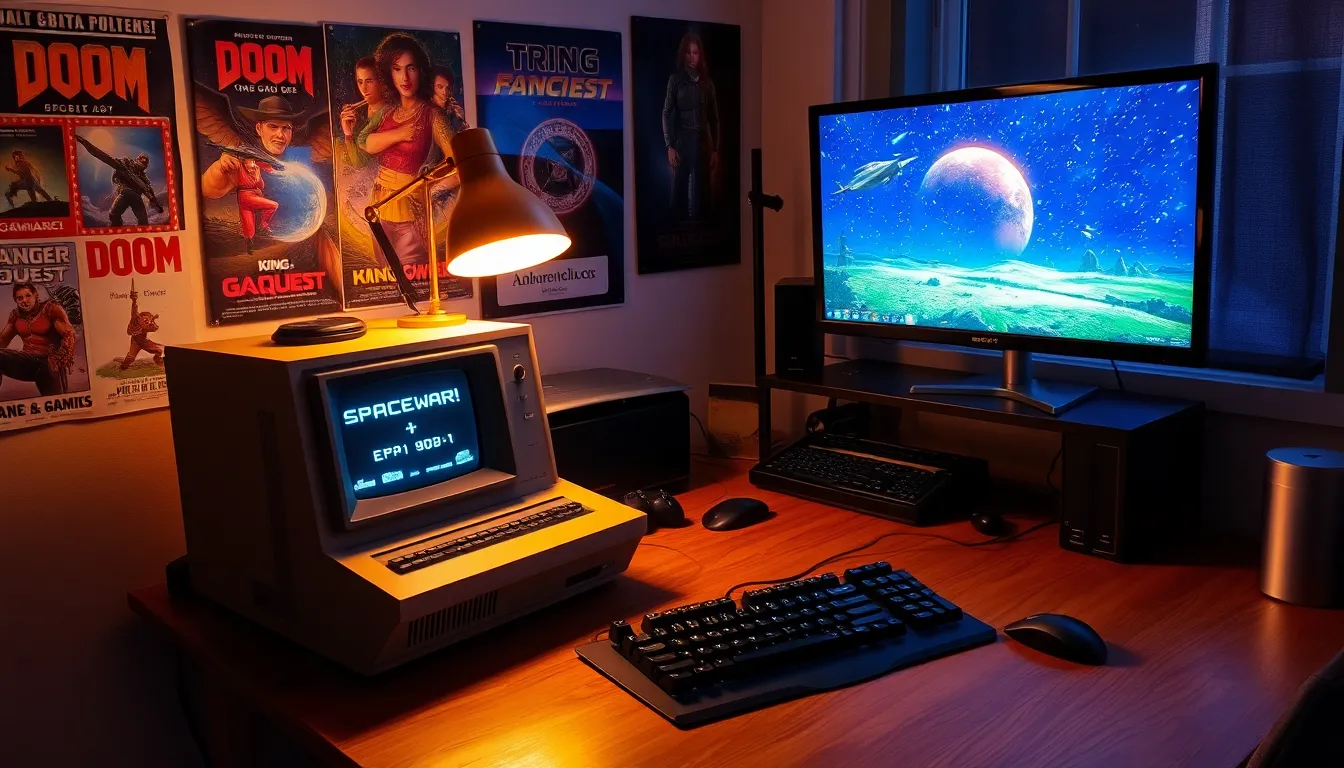In the ever-evolving world of video games, PC gaming stands out as a multifaceted and dynamic element of the industry. From intricate graphics to sprawling online communities, the PC gaming landscape is rich with history, innovation, and engagement. In this exploration, we’ll investigate into the key aspects that define PC gaming today, including its evolution, the impact of technology, the rise of online platforms, popular genres, the significance of modding, and what the future might hold for this vibrant medium.
Table of Contents
ToggleThe Evolution Of PC Gaming

Key Milestones In PC Gaming History
PC gaming traces its roots back to the early days of computers. One of the earliest examples is the game “Spacewar.” developed in 1962, which ran on a PDP-1 computer. By the 1980s, personal computers became widely available, leading to the advent of iconic titles such as “King’s Quest” and “Dungeon Master,” which introduced more immersive experiences.
The introduction of graphical user interfaces and advanced operating systems like Windows in the ’90s opened up new possibilities for gaming. Titles like “Doom” and “Quake” not only set the bar for graphics and gameplay but also shaped multiplayer gaming through the advent of LAN parties.
As the 21st century progressed, the introduction of powerful gaming hardware and high-speed internet further propelled the industry. The continual evolution of GPUs, CPUs, and gaming peripherals has enriched the graphics and gameplay experience, leading to larger worlds and more intricate storylines.
Impact Of Technology On Game Development
Technology has been a driving force behind the evolution of PC gaming. The development of 3D graphics, for instance, has transformed how games are designed. Game engines like Unreal and Unity have made it more accessible for developers to produce high-quality graphics and realistic physics, allowing for an immersive experience that attracts a diverse gaming audience.
Also, advancements in AI have significantly improved NPC behavior, contributing to richer narratives and more engaging gameplay. Enhanced audio technology has also added layers of realism, drawing players deeper into the gaming universe.
The Shift To Online Gaming
How Multiplayer Changed The Landscape
The transition from single-player to multiplayer gaming marked a significant pivotal point in PC gaming. Early on, games like “Counter-Strike” and “World of Warcraft” began cultivating online communities, allowing players from around the world to connect, collaborate, and compete. This shift not only enhanced gameplay but also fostered a sense of belonging among players.
As multiplayer games evolved, so did the formats, from competitive matches to cooperative gameplay. This adaptability has ensured that online gaming remains relevant, appealing to both casual gamers and hardcore enthusiasts.
The Rise Of Streaming Platforms
With the rise of faster internet speeds, platforms like Twitch and YouTube Gaming have emerged, creating a new dimension for PC gaming. Gamers can now broadcast their gameplay live, sharing experiences, strategies, and commentary in real time. This interaction has transformed gaming from a solitary experience into a shared global event.
Impressively, streaming has cultivated a culture where influencers and professional gamers can engage with their audiences directly. The integration of donations and subscriptions further solidifies the economic viability of this new model.
Popular Genres And Their Communities
Action, Adventure, and RPGs
PC gaming encompasses a vast variety of genres. Action and adventure games like “The Witcher 3” and “DOOM Eternal” captivate players with their engaging storylines and thrilling gameplay. RPGs offer a uniquely personal experience, allowing gamers to invest time into character development and world-building.
The communities surrounding these genres are often vibrant and supportive, with forums and social media groups dedicated to discussing strategies, lore, and fan theories. Players not only connect over their love for particular games but also share tips, artwork, and even fan fiction.
Simulation and Strategy Games
On the other side of the spectrum, simulation and strategy games such as “The Sims” and “Civilization VI” offer a different flavor for PC gamers. These genres often attract players who revel in planning and execution, often leading to deep discussions and analyses within their communities. Mods are essential in these types of games, as players often enhance their gaming experience by integrating custom content.
The Importance Of Modding And Customization
Creating A Personalized Gaming Experience
Modding holds a crucial place in the PC gaming community. Gamers frequently seek ways to personalize their experiences, whether through cosmetic changes, improved graphics, or entirely new storylines. This ability to modify games not only enhances enjoyment but also empowers players, allowing them to put their mark on their favorite titles.
The modding community continually evolves, with platforms like Nexus Mods and Mod DB serving as hubs for sharing and discovering new content. This vibrant ecosystem fosters creativity and keeps older games alive by introducing fresh content and gameplay mechanics.
The Role Of Mods In Community Engagement
Also, mods play a significant role in community engagement. Many players collaborate on modding projects, fostering a sense of camaraderie and teamwork. This collaboration often expands to include developing entirely new games, demonstrating just how interconnected the PC gaming community truly is.
Looking Ahead: The Future Of PC Gaming
Emerging Technologies And Trends
As technology continues to advance, the future of PC gaming appears promising. The expansion of virtual reality (VR) and augmented reality (AR) is quickly reshaping the gaming landscape. VR headsets like the Oculus Rift and Valve Index create immersive environments, allowing players to step directly into their favorite games.
Cloud gaming services, such as NVIDIA GeForce NOW and Google Stadia, are also on the rise. These platforms allow gamers with less powerful hardware to access high-quality games, democratizing gameplay and expanding the playerbase.
The Possible Impact Of AI And VR
Artificial intelligence is set to play a monumental role in future gaming development. Game design could become more efficient and innovative, utilizing AI to craft responsive environments and dynamic storytelling. Also, AI-driven NPCs may offer players unique interactions that could change gameplay experiences fundamentally.
The combination of these technologies not only promises to enhance the realism of games but also to push the boundaries of what players expect from their gaming experiences.
Conclusion
As the world of PC gaming continues to evolve, it remains a vibrant hub of innovation and community collaboration. From its rich history marked by technological advancements and creative storytelling to the modern-day phenomenon of streaming and extensive modding, PC gaming has solidified its place in the lives of millions.
Looking ahead, the prospects of emerging technologies such as VR and AI will undoubtedly shape the future landscape of gaming, offering new opportunities for connection, engagement, and fun. In this ever-changing environment, one constant remains: the passion of gamers for immersive, fulfilling experiences.






